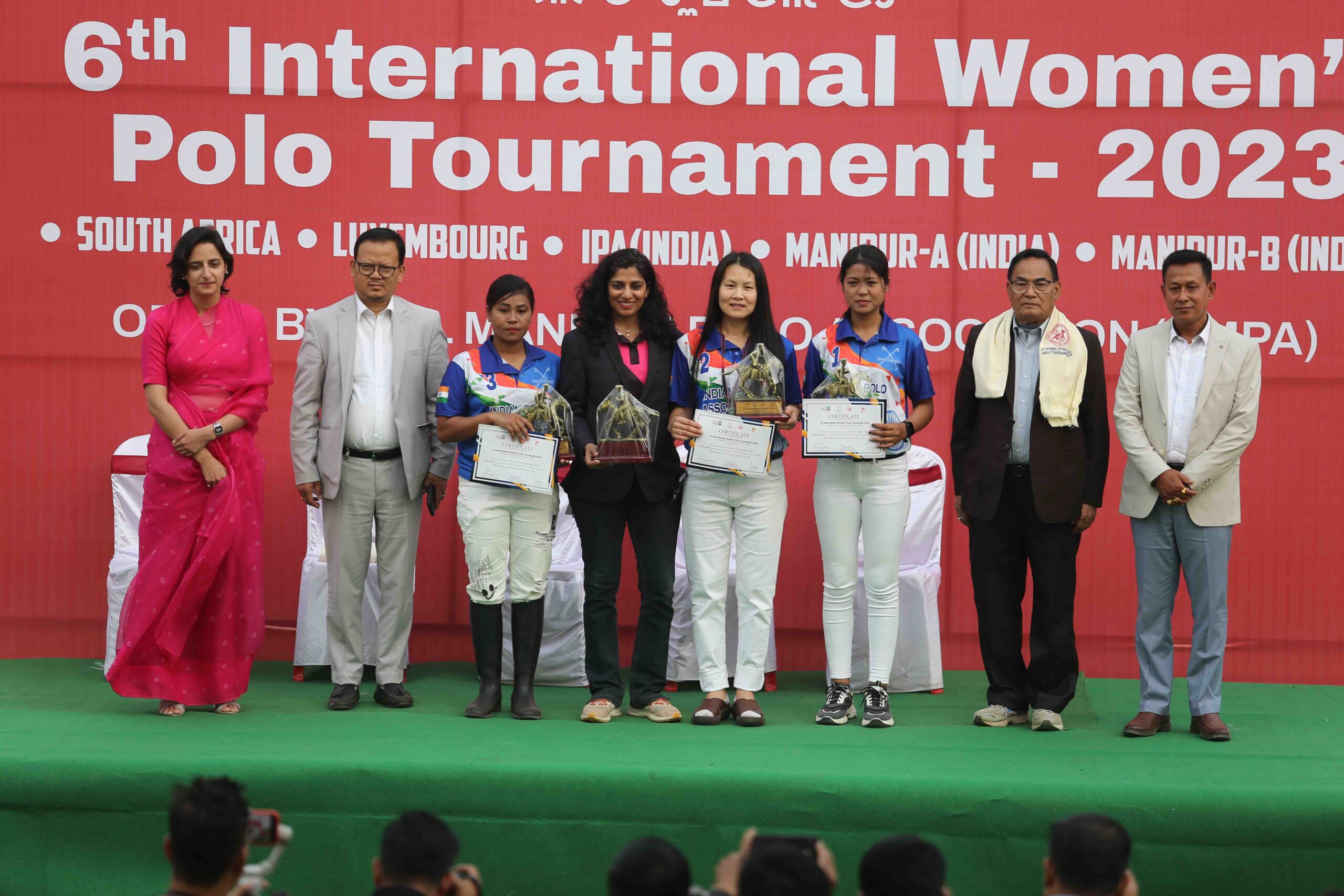Manipur Polo: Celebrating the State’s Cultural Heritage through Sagol Kangjei and Statehood International Women’s Tournament
By Shivani Joshi
Manipuri Polo is a unique and fascinating game that has enthralled people for generations. Rooted in cultural history and steeped in ancient mythology, Sagol Kangjei or Manipuri Polo exemplifies the spirit of Manipur – a breathtaking state in northeastern India, renowned for its rich cultural diversity, remarkable history, and spectacular natural landscapes. More than just a physical challenge, the game represents a tribute to the ancestors who created it, an acknowledgment of tradition, and an expression of pride for the Manipuri people.
Sagol Kangjei is more than just a game – it is a mystical experience that connects Manipuris with their ancient mythology and rich history. Legends tell of the sylvan gods, led by Marjing, Thangjing, Wangbrel, Khoriphaba, and Ikop Ningthou, who played Sagol Kangjei in times long past. Others believe that the renowned Meitei king, Nongda Lairen Pakhangba, ruled Manipur from as early as 33 AD, and maintained a pologround for regular games of Sagol Kangjei.
Today, Sagol Kangjei is an intrinsic part of Manipur’s cultural identity, played on special occasions ranging from state functions to religious festivals. It is more than just a pastime – it is a tribute to the state’s history, a celebration of its vibrant culture, and a way of connecting with the ancient past that is so deeply intertwined with Manipuri identity.
Deep in the heart of Manipur, a state located in the northeastern region of India, lies a cultural treasure that is in danger of being lost forever: the Manipur Pony. This small but sturdy breed of horse has been a staple of the state’s heritage for centuries, playing a vital role in the traditional game of Sagol Kangjei, which gave birth to the internationally recognized sport of polo.
However, the population of Manipur Ponies has been dwindling rapidly over the past decade. In 2003, there were almost 2,000 ponies in the state, but that number has dropped to a mere 700 as of 2011. The reasons for this decline are varied, with factors such as the growing demand for larger horses in international polo and the lack of access to traditional equipment being among the leading causes.
The history of the Manipur Ponies and their association with the Manipur Kingdom is fascinating. In the post-Pamheiba period, when the kingdom faced multiple defeats from Burmese forces, the valor of the skilled cavalrymen and the fame of the Manipuri ponies came to the fore. The cavalrymen used weapons like ‘Arambais’ from the horseback, creating havoc among the Burmese soldiers. The effectiveness of these weapons was recognized by the Burmese empire, showcasing the prowess of the Manipur Ponies and their riders.
To preserve and promote the traditional game of Sagol Kangjei and the Manipur Pony breed, the All Manipur Polo Association (AMPA) has taken a significant step. In a historic moment for the state, the AMPA decided to conduct the Chief Minister’s Sagol Kangjei Championship inside the ancient Kangla Fort during the Sangai festival in 2022.
For the first time in history, Sagol Kangjei, the indigenous game that is the origin of international polo, was played inside the Kangla Fort. The Mapal Kangjeibung and Kangla Manung Kangjeibung were the sacred grounds where the ancient game was played, but the Kangla Fort had always remained out of bounds. The AMPA’s efforts had finally made it possible to revive and sustain this game, along with the Manipur Pony breed, and ensure that the state’s cultural heritage remains preserved for future generations.
The tournament was a grand success, attracting polo players and enthusiasts from all over the world. The Chief Minister’s Sagol Kangjei Championship had become a platform for the players to showcase their skills and learn about the indigenous game.
The success of the tournament had fueled the AMPA’s determination to preserve and promote the game further. In collaboration with Manipur Tourism, the AMPA held the 6th edition of the international Women’s polo tournament, attracting female players from all over the world.
It not only promoted the sport but even broke down stereotypes and encouraged more young girls to take up the sport. “The number of female players is increasing every year,” said Neelu, one of the players from Manipur. The tournament had become an important event in the cultural calendar of Manipur, and its success had fueled the AMPA’s determination to preserve and promote the game further.
The tournament is part of Manipur’s effort to establish itself as India’s center for women’s polo and showcase the sport as a pioneer. “We believe that we have come a long way towards making Manipur a home for women’s polo,” commented Shri W. Ibohal Singh, Director (Tourism), Manipur.
This year’s tournament invited ladies from Luxeembourg and South Africa who played alongside local ladies of Manipur and a team from India ( IPA). “We are immensely grateful to the All Manipur Polo Association and everyone involved in making this tournament a reality, including the entire tourism department. It has been a pilgrimage for us to learn about the roots of polo, play on the iconic grounds and legendary ponies, and witness the monumental sculpture at the Marjing Polo Complex. This experience has blown us away, and we will be spreading the word to as many polo players as we can – they must come to Manipur.” commented the winning team South Africa on behalf of South African Polo Association.
Dr. Saratchandra Singh, President of All Manipur Polo Association, added, “The ether of Lord Marjing’s urge for Women’s Power in the world through Polo has now reached South Africa and Luxembourg following the USA, the UK, Argentina, Australia, Kenya, and still the Lord wishes to spread the message to other parts of the planet.” Rabii Benadada, a scratch polo player from Morocco & enthusiast of the sport shared his experience “I strongly believe that Polo is a universal language that creates bonds beyond borders. It’s truly refreshing to see how this sport breaks barriers and brings people from different countries and cultures together. Being a part of this wonderful tournament and representing Luxembourg in India has been an incredible experience, and I am grateful for the opportunity to witness how Polo can unite us all.”
The tournament had also become a platform for the players to showcase their skills and learn about the indigenous game. As I left the Women’s International Polo Tournament, I couldn’t help but feel inspired by the power and resilience of the women players. They had become pioneers in the world of modern polo, and I left with a newfound appreciation for the sport and a hope that more young girls in the state would be inspired to take up the mallet and ride with the wind just like these women players on the traditional Manipuri ponies.




